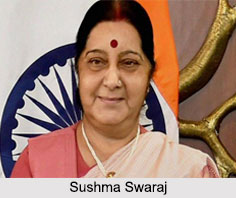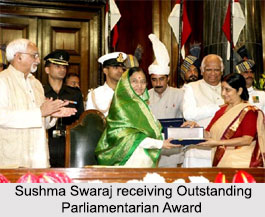 Sushma Swaraj was an Indian politician and member of the Bharatiya Janata Party. She was also a good orator while she delivered speech in Lok Sabha. Sushma Swaraj was elected Member of Parliament seven times and Member of Legislative Assembly thrice. She has served as the Minister of External Affairs in the first term of the Narendra Modi led Government. Sushma Swaraj was the first female Spokesperson of a national political party in India.
Sushma Swaraj was an Indian politician and member of the Bharatiya Janata Party. She was also a good orator while she delivered speech in Lok Sabha. Sushma Swaraj was elected Member of Parliament seven times and Member of Legislative Assembly thrice. She has served as the Minister of External Affairs in the first term of the Narendra Modi led Government. Sushma Swaraj was the first female Spokesperson of a national political party in India.
Sushma Swaraj became the youngest Cabinet Minister at the age of 25. Later she also served as a Chief Minister of Delhi in the year 1998. She became the External Affairs Minister in Union Cabinet on 26th May 2014.
Early Life of Sushma Swaraj
Sushma Swaraj was born on 14th February 1952 in Ambala Cantonment, Punjab to Shri Hardev Sharma and Laxmi Devi. Her father was a prominent member of Rashtriya Swayamsevak Sangha (RSS). She was educated at S. D. College, Ambala Cantonment and earned B.A degree in Sanskrit language and Political Science. She studied L.L.B. at Punjab University, Chandigarh and practised as an advocate in Supreme Court of India from the year 1973. She was declared the best cadet of N.C.C. of the S. D. College for three consecutive years.
Political Career of Sushma Swaraj
Sushma Swaraj began her political career with Akhil Bharatiya Vidyarthi Parishad in the 1970s. She joined the Bharatiya Janata Party movement and campaigned against The Emergency, during the time of the Prime Ministership of Indira Gandhi. She was a member of the Haryana Legislative Assembly from 1977 to 1982 from Ambala Cantonment by defeating the-then Minister of Defence and 4th time Chief Minister of Haryana, Bansi Lal. In July 1977, Sushma Swaraj was sworn in as a Cabinet Minister in the Bharatiya Janata Party Government headed by Devi Lal. She became State President of Bharatiya Janata Party (Haryana) in 1979, when she was 27. Later she became the Education Minister of Haryana when Bharatiya Janata Party and Lok Dal coalition government formed during 1987-90. She was Minister of Health, Family Welfare and Parliamentary Affairs from January 2003 to May 2004.
 Sushma Swaraj was elected to the 11th Lok Sabha from South Delhi constituency in April 1996 elections. She was the Union Cabinet Minister for Information and Broadcasting. She was re-elected to 12th Lok Sabha from South Delhi Parliamentary constituency for a second term in March 1998. She was sworn in the same position with additional charge of the Ministry of Telecommunications from 19th March 1998 to 12th October 1998. She was re-elected to the Rajya Sabha for third term in April 2006 from Madhya Pradesh state. She served as the Deputy leader of Opposition in Rajya Sabha till April 2009.
Sushma Swaraj was elected to the 11th Lok Sabha from South Delhi constituency in April 1996 elections. She was the Union Cabinet Minister for Information and Broadcasting. She was re-elected to 12th Lok Sabha from South Delhi Parliamentary constituency for a second term in March 1998. She was sworn in the same position with additional charge of the Ministry of Telecommunications from 19th March 1998 to 12th October 1998. She was re-elected to the Rajya Sabha for third term in April 2006 from Madhya Pradesh state. She served as the Deputy leader of Opposition in Rajya Sabha till April 2009.
Sushma Swaraj had served as the Indian Minister of External Affairs under Prime Minister Narendra Modi from May 2014 to May 2019. She was responsible for implementing the foreign policy of Narendra Modi. She was only the second woman to hold this position after Indira Gandhi.
Achievements of Sushma Swaraj
As an External Affairs Minister, she played a pivotal role in bringing back the 23-year-old hearing and speech-impaired Indian girl named Gita who was stranded in Pakistan for 15 years. The following are the awards received by Sushma Swaraj:
Awarded the Best Speaker by Haryana State Assembly.
Awarded the Outstanding Parliamentarian Award two times in 2008 and 2010.
Awarded the prestigious Grand Cross of Order of Civil Merit in 2019.
Personal Life of Sushma Swaraj
Sushma Swaraj is married to Swaraj Kaushal, who is a senior advocate of Supreme Court of India and a criminal lawyer who served as a youngest Governor of Mizoram from 8th February 1990 to 9th February 1993. Swaraj Kaushal was a Member of Parliament from 1998 to 2004. The couple have a daughter, Bansuri Swaraj who is a graduate from Oxford University and a Barrister at Law from Inner Temple, London.
Sushma Swaraj was the President of Hindi Sahitya Sammelan of Haryana for 4 years.
Death of Sushma Swaraj
Sushma Swaraj succumbed to death on 6th August 2019 after suffering a massive cardiac arrest. She was rushed to AIIMS Delhi after her cardiac arrest, where she later died.






